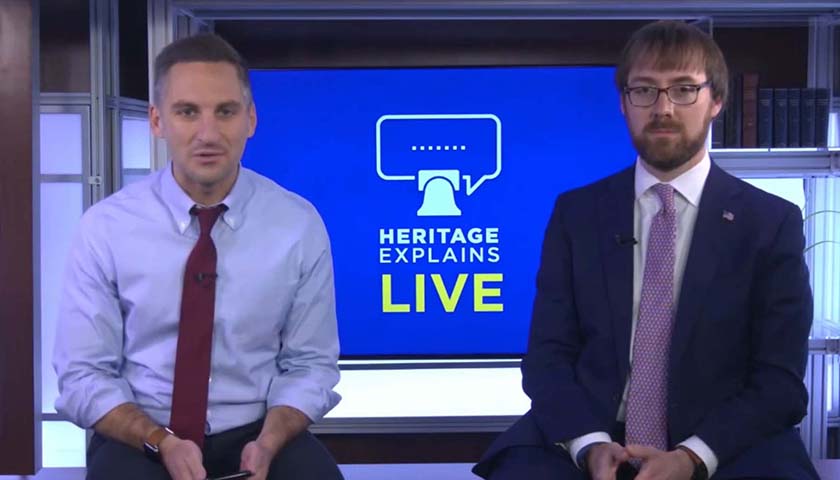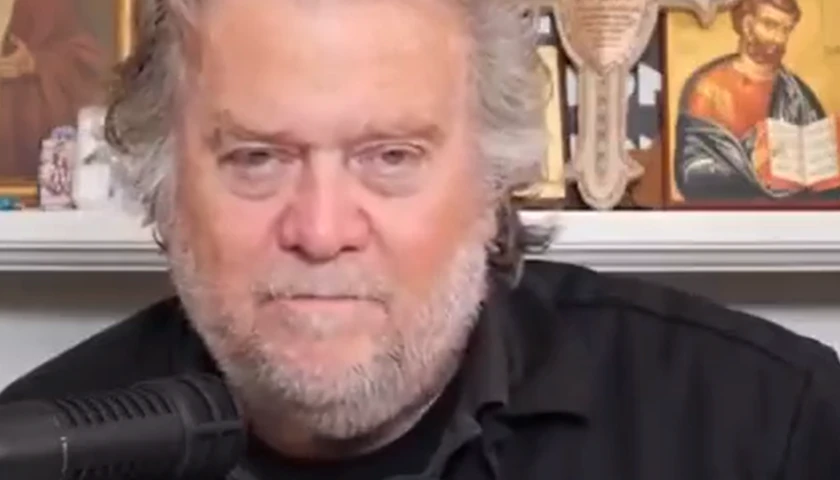Could Kyle Rittenhouse face another trial? Does Rittenhouse have grounds to sue media outlets for defamation? What about the behavior of the prosecutors during the trial? The Heritage Foundation’s Zack Smith, a former prosecutor, joins Tim Doescher of “Heritage Explains” to answer these questions and more. Watch the full interview here or read, below, an edited and abridged transcript.
TRANSCRIPT:
Tim Doescher: The [Kyle] Rittenhouse verdict is in. Not guilty on all charges. Not guilty. Not guilty.
Zack Smith: Good.
Doescher: I did it right. OK, good. Yeah, that’s right. All eyes are on Kenosha, Wisconsin right now. And if you watched the verdict happen live, we saw an emotionally shaken Rittenhouse respond when the verdict was delivered. … I’m joined by Zack Smith. He’s a legal fellow here in the Meese Center at The Heritage Foundation. What was your initial reaction here today?
Smith: Well I think based on what we saw presented at trial, this not guilty verdict certainly seemed to be the appropriate outcome in this case. … I spent several years as an assistant U.S. attorney down in Florida as a federal prosecutor, and so it was very interesting to watch this case play out, watch the facts as they developed, watch the tactics that the prosecutors in this case were using. And sometimes how things come across on TV or to us who are watching on TV and have a knowledge of what’s happening outside the presence of the jury, you always wonder how that’s playing with the jury themselves.
But I think in this case, the jury reached the correct decision. Prosecutors did not prove their charges beyond a reasonable doubt. … And Kyle Rittenhouse was acquitted.
Doescher: Just go through for us, so there were five charges. … Go through those, and we can talk about the severity of them.
Smith: So instead of going through each five individually, I think it makes sense to think about them on a continuum. They’re obviously very serious charges, murder, several counts of murder. … Potentially years or life imprisonment even, reckless endangerment, another very serious charge. And then there were a couple of minor charges. There was a minor in possession of a firearm charge, whether or not Kyle Rittenhouse could in fact legally possess that AR-15. …And then there was also a curfew violation charge. …
You know what I think is interesting about that, Tim, is I think how the prosecutors, the attention to detail they used with those small charges are really indicative of how they approached the whole case. And unfortunately, they handled those small charges in a very sloppy manner. In fact, the curfew charge was dismissed by the judge because the prosecutors had not submitted evidence to support it.
Doescher: I think it’s funny, just building off of that, one of the interesting things in following this case was not just trying to keep up with all that was going on in the courtroom, but trying to keep up with how the prosecution was being corrected. … But just building on that, what initially in your perspective were some of the troubling spots that you saw as a prosecutor?
Smith: Right. Well I think there were really a couple. There were three really confusing moments. I didn’t understand what the prosecution was doing or why they were doing it. One is we saw the judge get very upset with Thomas Binger, one of the prosecutors, at a couple of points in the trial.
And appropriately so because at one point, he was commenting on Kyle Rittenhouse’s decision to remain silent before he testified. Tim, that’s black letter law. It’s something you learn on one of your first days as a new prosecutor, you don’t comment on a defendant’s choice to remain silent.
And so to see someone who is an experienced prosecutor who should have known better to do that really was very surprising. And I think the judge appropriately got very upset with him for that.
One of the other surprising instances that happened, the judge had excluded some evidence from coming into to the case. Thomas Binger went ahead and started questioning Kyle Rittenhouse about that. Again, you saw the judge get very upset by that.
And here’s the thing, if you think some evidence has come in that would cause the judge to revisit his ruling, the appropriate thing to do is ask for a sidebar, ask for a recess and discuss that with the judge out of the presence of the jury, not just immediately go into it.
And so the judge was getting a lot of grief on social media for how upset he got with Thomas Binger for doing that. But I think anyone who’s tried a case knows that that is the reaction or worse that you would really suspect to happen if you did that.
And then the third thing that I thought was surprising, there were some tech issues involved with the case … about a certain video, whether it was sent from an iPhone or an Android, the compression rate, when the prosecution turned that over, all of that is stuff that should have been worked out in advance. And in fact, the prosecutors have a constitutional obligation to turn certain evidence over to defense attorneys in a timely manner.
And so to see those types of issues being raised as a prosecutor, that’d make me very nervous.
Doescher: And folks, keep that in the back of your mind as we continue to go through this today. The role of a prosecutor, there’s so much power in the role of a prosecutor. I mean they are the ones that they really do have people’s future in their hands. They are the ones that bring the charges. They are the ones that put people in a place of, “Am I guilty or am I not guilty?” And when you don’t follow that, that’s a problem.
Smith: Right. And look, I think this ties in nicely to a larger conversation that’s happening right now. But I think what’s important to keep in mind, Tim, is that if a prosecutor does a bad job or they do something that may be ethically questionable … the solution isn’t to recast the system out of whole cloth, start over, burn it down.
The appropriate thing to do is to hold those individual prosecutors accountable for their actions. And so I think that’s something I’d really encourage folks to keep in mind as we analyzed what happened in this trial going forward is that if prosecutors act unethically potentially or make bad decisions, it’s important to hold those prosecutors accountable, not necessarily to recast the system.
Doescher: And when you talk about accountability here, we’ve got a lot of great questions coming in here, folks. Thank you so much. Jonathan is watching from San Diego, California. … He says, “What would happen to the prosecutor for lying?”
Smith: Well certainly if you lied in court, if you lied to a judge, that’s a very serious matter. …You would … have potential bar issues.
Doescher: Sure. People can file a complaint against you.
Smith: They can file a complaint. The judge him or herself could potentially refer you to the bar. …But we talked about those evidentiary issues earlier, the obligation to turn certain evidence over, those are constitutional obligations. …
There are two cases called Brady and Giglio. Any prosecutor in the country knows those. If the prosecutors in this case or any case are found to have violated their obligations under those cases, I would certainly suspect there would be bar issues for them as well.
Doescher: Interesting. Yeah. And we’re not saying that there was blatant lying going on here.
Smith: Right.
Doescher: But it’s just an interesting charge because if people are asking that question, there clearly has been some questioning of the prosecutor’s role here. .. So Cheryl is on Facebook. She says, “How have we become a country where cases are being tried by the media?” I mean that’s very interesting. I mean this thing was wall-to-wall coverage.
Smith: I will say the encouraging thing here, those jurors, when they went into the jury box, they weren’t immune from what was happening outside. I’m sure they were aware that the National Guard was moving in. Even though they’re not supposed to watch the specific details of the case being covered in the media, I’m sure they were aware to some extent.
But look, at the end of the day, I think the right outcome was ultimately reached in this case based on the evidence that was presented. And so as unfortunate these charges were brought, I think some real questions need to be asked about why these charges were brought. But at the end of the day, our system of justice worked like it should. And Kyle Rittenhouse was acquitted because the prosecutors didn’t prove their case beyond a reasonable doubt.
Doescher: And building on that, the case has been settled. However, the question is here. We have a YouTube viewer that asked, “Does Kyle have actionable cases against the media?” We saw this in the [Nick] Sandmann case, all that stuff.
Smith: That’s a great question. In fact, Nicholas Sandmann recently wrote an op-ed in the Daily Mail talking about the similarities between his case and Kyle Rittenhouse’s case.
But look, unfortunately, any action against the prosecutor is unlikely to succeed. They enjoy very broad immunity, broad discretion for their charging decisions, unless it was motivated by some blatantly inappropriate purpose.
In terms of defamation actions, we’ll have to wait and see. Defamation is very difficult to pursue no matter what. We’ll get into questions whether or not Kyle Rittenhouse was a public figure, that changes the legal standards that would apply. I’m sure many people who commented on this case will try to say that they were stating their opinions, which are protected by the First Amendment. …
And Nicholas Sandmann made this point in his op-ed, defamation cases are tough, they’re long, they’re expensive to litigate. But it’ll certainly be interesting to see what happens coming out of this case. …
Doescher: Let’s go back to Rittenhouse here … I’ve had a lot of questions about can this case be retried? Could this be a federal thing?
Smith: No. … So it can’t be retried. These same charges cannot be retried by the state of Wisconsin. It’s protected by the double jeopardy clause and the Constitution. You can’t be tried twice for the same offenses.
Now, the federal government and the state government, they are separate sovereigns. So theoretically, the federal government could try to bring some type of charges related to this incident. If you think back to the Rodney King case, the police officers involved in that terrible incident, they were acquitted in state court.
The federal government came in though, brought federal charges against those officers. But that situation is a little bit different. Those were police officers. They were charged with violating federal civil rights laws. And again, the factual basis, again just based on what we saw presented at trial, certainly seems to be very weak to begin with. The fact that he was already acquitted in state court. I think, just my personal views, it’d be really a stretch to see the feds try to step in and bring any charges in this case.
Doescher: President [Joe] Biden said he’s angry and concerned over the Rittenhouse acquittal for the Kenosha killing. What message does that send for the president of the United States to say that? I mean this seems an awful lot like the federal government, again, coming in a place where they should not be.
Smith: And I think it’s more fundamental than that. Having fair, independent, impartial courts is one of the core values that we cherish as Americans. … We should all have confidence in our system of justice that if we are hauled before our courts, we’ll face an impartial jury.
And unfortunately, if I can step back and take the 40,000 foot view for a second … I think under the Biden administration, we’ve seen a politicization of the Department of Justice that’s very troubling in a lot of ways. I think seeing Joe Biden make these statements is indicative of that. But we’ve seen [Attorney General] Merrick Garland ordering the FBI to go investigate parents who raised concerns about critical race theory at their local school boards.
We’ve seen the civil rights division of the Justice Department filing what I think are politicized lawsuits against states like Georgia and Texas for implementing common sense voting legislation. And so I think this continuing trend to politicize the FBI, to politicize the Department of Justice, to politicize our legal system as a whole is very troubling and it’s something we should all be concerned about and all push back very aggressively on.
Doescher: Yeah. As we draw to a close here, I wanted to give you a chance to encapsulate your piece that you did for The Daily Signal. … just give us the takeaway from this Rittenhouse case with the prosecutor and all the missteps that were made.
Smith: Well look, this is a case that should never have been brought. And fortunately, it looks like it was probably brought for political purposes rather than for the purpose of seeking justice. … A prosecutor’s job is to seek justice. I don’t think that was the goal of the prosecutors in this case. But at the end of the day, our system of justice worked, Kyle Rittenhouse was acquitted. And that should give us all some level of comfort.
– – –
Photo “Heritage Foundation Legal Expert Zack Smith Answers Your Questions About the Rittenhouse Verdict” by The Heritage Foundation.




